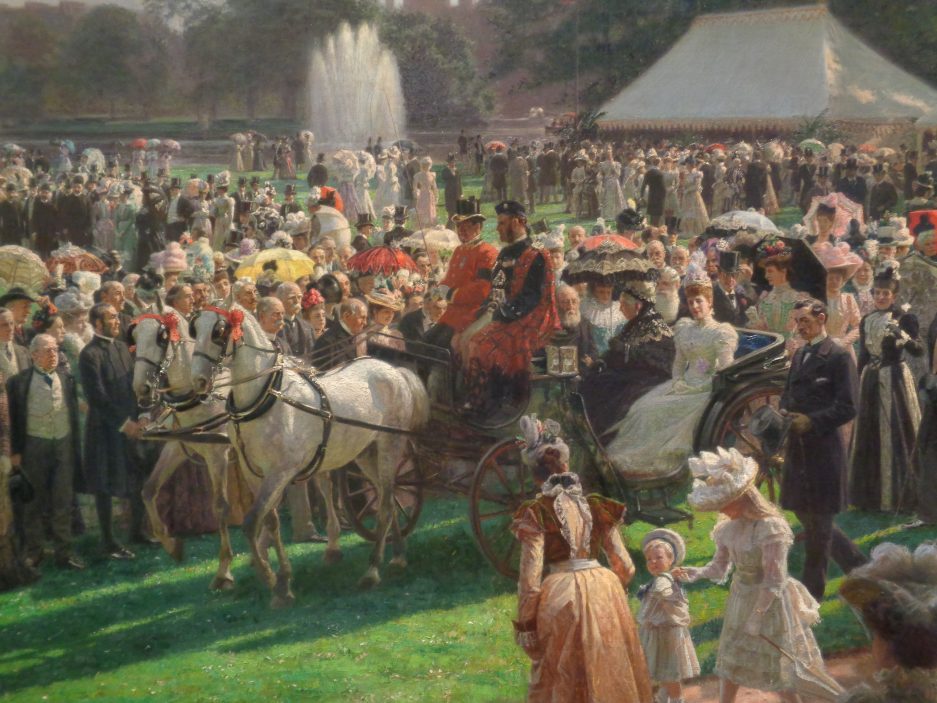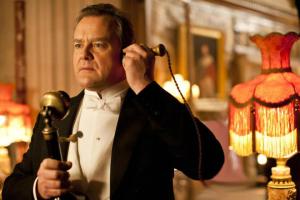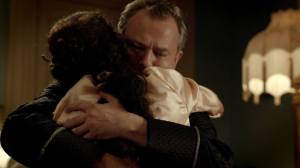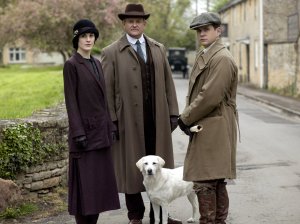At the risk of testing the patience of our readers I’m going back to the entail. I was re-reading our entry of a few weeks ago and some logical lapses jumped out that I hadn’t seen before; and I’ve no idea whether they are there because Julian Fellowes didn’t spot them or because he thought that we wouldn’t. So bear with me and let’s see if there are some things that don’t make sense here.
In series 3 episode 1 we are told that Robert is in London at his lawyer George Murray’s office in Chancellor Lane. He is told that his investment in the Canadian Grand Trunk Railway, which he made over the advice of counsel, has been lost. The line is bankrupt and will be nationalized. The majority of Cora’s money is gone. Murray says that the estate could be broken up and sold, but Robert refuses. The estate must be a major employer and support the house or what is the point. Robert says that he will not give up and be the Earl who lost it all. Later on Robert has had to tell Cora, as they are preparing for bed, that he has lost a lot of money in a bad investment. He hesitantly tells her that he has lost almost all of her fortune.
Yet in series one episode 1 we hear that Violet, the Dowager Countess, assumes Robert, the present Earl, will break the entail and make an heiress of his eldest daughter, Mary, but Robert is not so sure. To make matters worse, his wife, Cora, has her own money tied up in the estate, and there is no way to extract it without crippling Downton. Even if Robert could break the entail, or take Cora’s money out of it, would he want to? (extracts from downtonabbey.wikia.com, my bold.)
So let’s see. In series 1 Fellowes says that Cora’s fortune is tied up in the entail and can’t be touched unless the entail is broken. In series 3 Robert has been investing all her money badly so either the bit about the entail is wrong or the amount of money that’s been tied up isn’t as much as we were led to believe; and if that’s the case and Robert has free use of most of Cora’s money then a) he could give Mary a big enough dowry to make her a tempting marriage prospect and hence b) there’s no need for the entail to be broken. Cora not having her own money is a side issue – except it isn’t, is it? If Robert has access to her money why doesn’t he make her an allowance?
It comes down the simple point that either Cora’s money is tied up or it isn’t and Fellowes has shifted ground to make Robert in the wrong again (of course) because he thought we couldn’t or wouldn’t work it out; or he forgot what he said in series 1. If Robert can invest the greater part of her money then it’s not entailed. The only reason why Robert can invest the money is because its not entailed; if its entailed then he couldn’t touch it. And wouldn’t Cora and Robert know how much was entailed and how much not? I certainly had the impression from series 1 that all of the money she brought to the marriage had been tied into the estate.
Robert also says to Sybil in series 2 when she wants to marry Branson that there will be no more money for her. Why not, if he can do what he likes with it? If he has the disposal of the majority of Cora’s money he can just give Sybil some more (if he feels so inclined). The mere fact that he says “there will be no more money” implies that that’s exactly what he can do if he feels like it; and clearly he can do what he likes with the lion’s share because he’s invested it and lost it all and has to be rescued by another fortune coming along just when it’s needed. Cora’s money is in the entail precisely to prevent it being lost, and if it’s lost then it ain’t entailed.
If the majority of the money isn’t entailed, which Robert losing the whole shebang suggests it isn’t, then series 3 directly contradicts all the goings on in series 1. If it was all entailed he couldn’t lose it. He couldn’t actually touch it in the first place. That, as we were all told during series 1, was the whole point of the entail – it was to prevent the sort of bad investment Robert made with the railways. Perhaps too that’s why they begin to live the life of Riley in series 4 with Matthew’s money as probably that’s not entailed either. While you’d hope that Matthew tied up the money so that Robert couldn’t squander it, that solicitor did forget to make a will.
I find Fellowes’ plotting so hilariously bad and this is just one example of it. I’ve always thought that these series are so plot driven that consistency either of story line or character is ignored. He sets up the entail in series 1 then by the time Robert loses the money in series 3 he probably reckoned that viewers would have forgotten about it; and that’s if they understood it in the first place. I bet this is a family that is now asset rich but cash poor – one of the reasons for selling the Piero della Francesca was to raise money and having to sell up to a builder is the strongest indication that none of their schemes have been making money and they’re spending more than they’re earning – and that breaking the entail is part of series 6; and if it is, what’s the point? There’s no money left after Robert has lost it. Sure, they can sell land but land wasn’t fetching very high prices in 1925 with the amount that was coming on the market what with various cash strapped peers unloading parts of their estates. The whole point of Robert marrying Cora was that the Crawleys were broke so they had to a) get a woman with money b) entail the money so c) they would not be in this situation again – and just like breaking the entail in the first place Fellowes has presented us with a story line that conveys the exact opposite of what he meant.
Do you suppose he has noticed any of this? Or is one of us completely confused? No wonder series six is the last one – I have a feeling the Crawleys are teetering on the financial edge and we can’t possibly have Lady Mary joining the ranks of the nouveau poor aristos, can we? Mind you, as a last resort they could always sell the Gutenberg Bible.




I’ve stopped watching DA but my memory of the first three series was one of confusion so I suspect you’re absolutely right. It just shows that even if you come from the class depicted, it doesn’t mean you understand the finer details. Silly boy, that Fellowes. He should have stopped at Gosford Park and continued to concentrate on acting. Not that he’s such a great actor, either. (My inner bitch is showing!)
LikeLiked by 1 person
Your comment is spot on and from what is known about Julian Fellowes’ background, he’s not part of the upper class, he’s more upper middle class and his background is very obvious when you watch Downton Abbey and how the Crawleys are depicted. Someone said that even Sir Richard Carlisle had more class than all the Crawleys lumped together and that’s saying something.
LikeLiked by 1 person
I always thought there was something suspect about him. As gentry, do I trump him?! I’m never quite sure where gentry fits in the pecking order!
LikeLiked by 1 person
Gentry are non-noble and Fellowes would probably describe himself as such.
LikeLiked by 2 people
Probably you do. That’s the thing about the British class system, it might seem rigid but in reality there are subtle differences even within grades. Some gentry families have older and more distinguished lineages than those in the peerage. Like many things, nothing is always what it seems.
LikeLiked by 1 person
Shame. It would have been nice to trump him!
LikeLiked by 1 person
Ah. Well, I might be one of those. My maternal and paternal lines go way, way back.
LikeLiked by 1 person
Indeed. And if you have long standing ties to a particular local area then that’s another sign.
LikeLiked by 1 person
Interesting. On my mother’s side, it’s Herefordshire.
LikeLiked by 1 person
Oh wow!! What about your father?
LikeLiked by 1 person
All Navy as in Old Grog, Admiral Edward Vernon. He’s the most interesting ancestor on that side but my mother’s side, Hoskyns, has a feast of venerable ancestors!
LikeLiked by 1 person
Oh wow! That’s very, very interesting!!!
LikeLiked by 1 person
Ah, now your ‘wow’ comment makes sense! I was getting slightly confused and was sure I must be out of sync as it seemed a strange reaction to my mention of Herefordshire! You’ve reminded me that I haven’t yet published a small post I have ready for First Night History about him. I must do that.
LikeLiked by 1 person
Hahaha, they do become confusing at some point. Am looking forward to reading your post about your ancestor.
LikeLiked by 1 person
I’ve scheduled it for tomorrow morning. It’s a very short piece. I need to do some more research to write something fuller. You’ll find maternal pieces if you search on FNH with the term Hoskyns. https://firstnighthistory.wordpress.com/
LikeLiked by 1 person
Many thanks and looking forward to it.
LikeLiked by 1 person
‘…IS one of confusion…’ Hate leaving typos!
LikeLiked by 1 person
What about your background?
LikeLiked by 1 person
Traditionally gentry would have been landowners as well and serving the local community for generations.
LikeLiked by 1 person
Yes, indeed.
LikeLiked by 1 person
Hmm. It’s possible that there’s a flaw in your logic. We don’t know exactly what “the fortune is tied up in the estate” means, but I don’t think it must necessarily mean that Robert didn’t have the power to make decisions about how to invest it. In fact, I would imagine that the terms of the entail would state that Robert *alone*, as the holder of the title, would be allowed to make decisions about the money, although with a trusted firm like Murray’s as the Trustees to oversee the legal transactions. As long as Robert wasn’t squandering it by (a) giving control of any part of it to anyone outside of the line of primogeniture, or (b) spending it on anything unrelated to the furtherance of the estate (e.g., running up crazy gambling debts in Monte Carlo), he probably had quite a lot of discretion as to investments in either external financial instruments or internal property improvements.
LikeLiked by 1 person
You may be right there’s a flaw in my logic but it’s based on the information I have. It strikes me as odd that in series 1 we are told the money can’t be touched but in series 3 he can lose the whole caboodle. Robert might well be able to dispose of it but I’d have thought under strictly limited terms otherwise what’s the point of the entail in the first place? Clearly he’d have authority move investments around but it’s odd there’s no control over what he does. I’m surprised there aren’t trustees he has to consult – and if they are in America so much the better, he can’t act in haste. What it does illustrate is that there is absolutely no consistent narrative – Fellowes thought this was a good story line, no need to investigate the ins and outs – and then junks it and its implications in favour of another one. It’s basically a case of “move along home, nothing to see in here.”
I still think my argument stands – that in series 1 he’s saying one thing and in series 3 another. You can bat the arguments around for ever with no definite information. Many thanks again for taking time to read and comment, they have been insightful.
LikeLike
Robert can’t “touch the money” in the sense that he can’t give a significant chunk of it to Mary as an inheritance, which is the whole thrust of the series 1 conflict. The “strictly limited terms” would probably be along the lines that I mentioned earlier. Robert did have to consult his Trustees (Murray and his partners), but he overrode them. There’s no way an English lord would ever write an entail requiring himself or his heirs to actually *obey* the Trustees, however.
But overall I won’t argue with your assertion that Fellowes’ writing often doesn’t have a consistent narrative. I wouldn’t say “absolutely no consistent narrative”, but it’s certainly weaker than you’d expect from a mainstream, professional production. I finished series 1 with very high hopes and a great deal of joy, but I was disappointed by the shallow path that series 2 took through WWI and its aftermath, and the accompanying predictable love quadrangle plot for Mary and Matthew. I was further disappointed by the deus ex machine device used to save Downton after Robert lost the bulk of the money. It was then that I realized just how little forethought seemed to have gone into anything beyond the well constructed series 1. Series 4 was mostly fluff and nothing happened, and the two plots with resonance (Anna’s and Edith’s) weren’t handled as well as I’d hoped they would be. Series 5 seems to be a repeat of earlier series’ plot lines, but it’s lost most of its oomph on the rehash.
But I could see so much genius in series 1, with a huge potential for great storytelling and even education about a historical period that we haven’t seen a lot of until now, so Downton Abbey will always have a special place in my heart (and in the annals of my disappointments. 🙂
LikeLiked by 1 person
Again good points and I wholeheartedly agree with your summary of what went wrong with each of the the series. I was particularly disappointed with the handling of series 2 especially as there was so much potential with WW1 and yet it was squandered.
Series 1 had the luck of being given a lot of thought yet it could have been tighter had there been the people who could have ironed out the niggles we have been pointing out.
I’m one of the people who was of the view that Series 3 should have been the last especially when Dan Stevens told the producers in advance he wasn’t planning to renew and with the lack of the pivotal centre, we have been lumbered with series 4 and 5 which pretty much relied on parties and the revolving carousel of guest stars to distract from the lack of content. That said this reliance of guest stars began in series 3 with the casting of Shirley MacLaine as Cora’s mother and as we’ve seen – all that sound and fury ended up with a damp squib.
Well said with the last paragraph and which I heartily agree!
LikeLike
I agree that the show should have ended on the up note at the end of series 3. The main conflict set up at the beginning of series 1 had been resolved. Great; a satisfying story arc. Let’s stop while we’re ahead. I completely agree with you on the sense of most of these guest stars and new characters not being able to hold up to all the hype or really keep my interest. LOL on the “damp squib” description!
LikeLiked by 1 person
As we’ve said in our “When Downton Abbey Finally Jumped the Shark” entry, once Dan Stevens informed the producers he wasn’t renewing, Fellowes should have used series 3 as the countdown to end the whole thing with the birth of baby George as the ending or a fast forward scene with Matthew and Mary as Lord and Lady Grantham with their children. Once Matthew was killed off, there was nothing left.
LikeLike
Yes, Matthew was the core of the main conflict for the family, and the way that he saw things differently and did things differently continued to challenge all of them to be better people. I loved how he supported Edith when everyone else just treated her like a punching-bag, and how he always got on well with Sybil, and how he drew out Mary’s best self, and the way he befriended Robert, and Tom. Matthew had a way of correcting people through using humor, so they’d grudge the correction at first, but then come around. He was a bit of a fish out of water, and probably always would be, which is a lovely source for continuing drama. Matthew was also very much a man of his time, doing what he thought best to protect Rose and Edith from unsuitable men. Finally, Matthew was a very unusual character for popular media: he was a righteous man, but not a self-righteous one. When he was gone, the family just reverted back to their business-as-usual ways, and, no surprise, they got boring. 🙂
LikeLiked by 1 person
A lot of people have also said that he was the moral centre and once he was gone, the masks behind the Crawleys slipped and they simply became unpleasant. I also think that’s why viewers have simply stopped caring about the characters.
LikeLike
Yes, he was definitely the moral centre. That’s why things fell apart for me once he was gone. There was no one there to challenge anyone’s behaviour. But I can admire Fellowes for being consistent with his characterisations. For example, I thought Fellowes did a brilliant job of setting up such a fascinating philosophical duality between Mary and Matthew, but without Matthew there to balance her, Mary reverted to a cold version of herself that she had been on the path to becoming before she’d met him. It’s unpleasant to watch, but at least Fellowes stayed with the truth of his characters.
But more generally, I think viewers have simply stopped caring about the characters because there’s no story there to tell. There’s no there there any more.
LikeLiked by 1 person
Agree but I’m not sure about Fellowes being consistent, just look at Robert for a start – not very bright but decent and considerate in the beginning to reactionary buffoon by series 4. That said he has been consistent with say Carson who has been a snobbish pompous prig at the beginning and still is.
Spot on with the last sentence and I think too that’s why there is a general lack of interest in the last series.
LikeLike
But yes, I was very disappointed with how Fellowes seemed to assassinate Robert’s character in series 3, just to contrive an adversary for Matthew, it seemed. I liked Robert a lot in series 1 and 2, and he had some cool moments at the end of series 3. One of the things I’ve tried to do in T&P is show Robert’s perspective, and make it clear why he does what he does, so that he feels consistent throughout the years, even if he does irritating things from time to time.
LikeLiked by 1 person
Plus not to mention in series 4, Robert becomes an unpleasant yet weak character at the expense of Cora to the point where he makes a lapdog look strong and decisive in contrast.
LikeLiked by 1 person
But despite that, here we are, generating a flurry of discussion! Haha
LikeLiked by 1 person
But despite that, here we are, generating a flurry of discussion! Haha
LikeLiked by 1 person
We have indeed 🙂
LikeLike
(Sorry, I meant to reply to your last comment with my “Haha” comment, so would you be willing to delete this duplicate one that starts a new conversation thread, and this comment here, in parentheses? Thanks!)
LikeLiked by 1 person
No worries 🙂
LikeLike